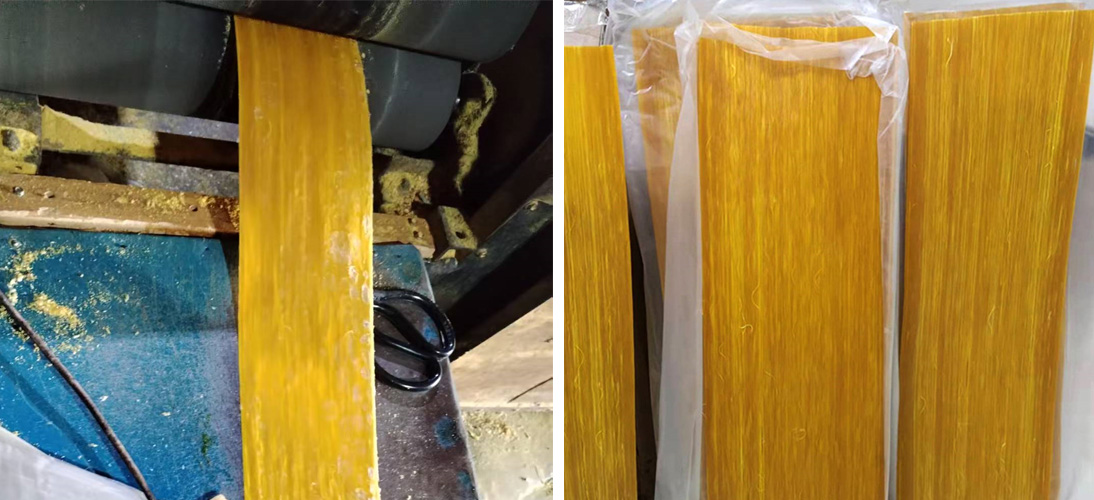Definition of Phenolic Molding Plastics (FX501/AG-4V)
Plastics refer to materials primarily composed of resins (or monomers polymerized directly during processing), supplemented with additives such as plasticizers, fillers, lubricants, and colorants, which can be molded into shape during processing.
Key Characteristics of Plastics:
1. Most plastics are lightweight and chemically stable, resistant to corrosion.
2. Excellent impact resistance.
3. Good transparency and wear resistance.
4. Insulating properties with low thermal conductivity.
5. Generally easy to mold, color, and process at low cost.
6. Most plastics have poor heat resistance, high thermal expansion, and are flammable.
7. Dimensional instability, prone to deformation.
8. Many plastics exhibit poor low-temperature performance, becoming brittle in cold conditions.
9. Susceptible to aging.
10. Some plastics dissolve easily in solvents.
Phenolic resins are widely used in FRP (Fiber-Reinforced Plastic) applications requiring FST (Fire, Smoke, and Toxicity) properties. Despite certain limitations (especially brittleness), phenolic resins remain a major category of commercial resins, with a global annual production of nearly 6 million tons. Phenolic resins offer excellent dimensional stability and chemical resistance, maintaining stability within a temperature range of 150–180°C. These properties, combined with their cost-performance advantage, drive their continued use in FRP products. Typical applications include aircraft interior components, cargo liners, rail vehicle interiors, offshore oil platform gratings and pipes, tunnel materials, friction materials, rocket nozzle insulation, and other FST-related products.
Types of Fiber-Reinforced Phenolic Composites
Fiber-reinforced phenolic composites include materials enhanced with chopped fibers, fabrics, and continuous fibers. Early chopped fibers (e.g., wood, cellulose) are still used in phenolic molding compounds for various applications, particularly automotive parts like water pump covers and friction components. Modern phenolic molding compounds incorporate glass fibers, metal fibers, or more recently, carbon fibers. The phenolic resins used in molding compounds are novolac resins, cured with hexamethylenetetramine.
Pre-impregnated fabric materials are used in diverse applications, such as RTM (Resin Transfer Molding), honeycomb sandwich structures, ballistic protection, aircraft interior panels, and cargo liners. Continuous fiber-reinforced products are formed via filament winding or pultrusion. Fabric and continuous fiber-reinforced composites typically use water- or solvent-soluble resole phenolic resins. Beyond resole phenolics, other related phenolic systems—such as benzoxazines, cyanate esters, and the newly developed Calidur™ resin—are also employed in FRP.
Benzoxazine is a novel type of phenolic resin. Unlike traditional phenolics, where molecular segments are linked via methylene bridges [-CH₂-], benzoxazines form a cyclic structure. Benzoxazines are easily synthesized from phenolic materials (bisphenol or novolac), primary amines, and formaldehyde. Their ring-opening polymerization produces no byproducts or volatiles, enhancing the dimensional stability of the final product. In addition to high heat and flame resistance, benzoxazine resins exhibit properties absent in traditional phenolics, such as low moisture absorption and stable dielectric performance.
Calidur™ is a next-generation, single-component, room-temperature-stable polyarylether amide thermosetting resin developed by Evonik Degussa for aerospace and electronics industries. Thisresin cures at 140°C in 2 hours, with a glass transition temperature (Tg) of 195°C. Currently, Calidur™ demonstrates numerous advantages for high-performance composites: no volatile emissions, low exothermic reaction and shrinkage during curing, high thermal and wet strength, superior composite compression and shear strength, and excellent toughness. This innovative resin serves as a cost-effective alternative to mid-to-high-Tg epoxy, bismaleimide, and cyanate ester resins in aerospace, transportation, automotive, electrical/electronics, and other demanding applications.
Media Contact
Company Name: China Beihai Fiberglass Co., Ltd.
Email: Send Email
Country: China
Website: https://www.fiberglassfiber.com/




